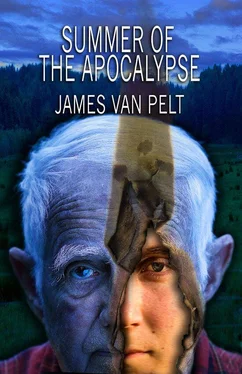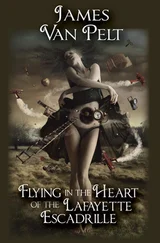Eric looked away, and as he did he observed a heavy scar marked the side of the boy’s face on the old man’s right. Eric walked a few more steps, then glanced at the group again, but they were gone. A breeze swirled tendrils of mist past the empty spot where the hikers had sat. The sense of deja vu vanished as if someone had thrown a switch, and Eric shook his head. His bike drug at his shoulder and he staggered a couple of steps. He realized he was near fainting; he hadn’t eaten for thirty-six hours. That’s it, he thought, I’m delirious.
He rested on a stump by the river and ate two beef jerky strips and a can of peaches. This is a beautiful spot, he thought, and he reflected on all the people who had driven through the tunnel for years and years and never seen this section of the river that the highway cut off by diving through the mountain instead of following the canyon. For the moment, he forgot where he was going and why. The jerky tasted salty and good, and the peaches were sweet and cold.
A junkyard lined the highway on the other side of the tunnel. Starting at the rock-choked tunnel entrance, and stretching for several hundred yards, a mess of cars crowded the road. At first Eric thought someone had painted black dots on the cars, then he realized that holes peppered them. Standing on the trail below, he saw that the closest car, a green Chevy Nova, sat unevenly. Three of its four tires were flat. A tight web of cracks frosted the windows. He clambered up the slope, pulling the bike behind him. A shift in the breeze wafted gasoline fumes over him and another smell, deep, bad and nasty. He snorted to clear his nose and mouth-breathed. When he stepped onto the road, he noticed that many cars had burned, their paint blackened and blistered from the heat.
Thousands of brass shell casings glittered on the highway by the tunnel entrance. He picked one up; it was much larger than the ones Dad used for the deer rifle. He imagined what must have happened. Weeks ago, when the traffic stopped, the police or the National Guard established a road block. Panic in the last couple of days forced people to flee. They were stopped here. He marveled that his family hadn’t heard any of the shooting. Last night’s explosion the final act to seal the road, provided the only clue of the battle.
Fearfully, he approached the Nova’s open passenger door and peeked inside where a black stain discolored the driver’s seat The stain shifted and Eric jerked back. Dozens of flies boiled off the stain; some flew out the window, but the rest settled on the seat again He swallowed hard to keep his stomach down. Dad might have been caught here. Maybe he was coming back with help and whatever happened stopped him. Eric checked the next car. It too was empty.
The third one wasn’t.
He thought at first that someone had left a pile of clothes on the seat until he saw the bare foot sticking out. Two lines of dried blood like the outline of a carrot traced their way from the heel to the curled toes A swarm of flies lifted itself angrily from the corpse then settled back when Eric stepped away. He sat hard on the pavement and rested his forehead against the cool metal door By wrapping his arms tightly around his midsection, he forced himself not to throw up.
One afternoon in the sixth grade he’d sneaked into an adult Driver’s Ed class that the elementary school sponsored in an unused classroom He’d heard they were watching a “cool, gross film, and he and two of his friends dared each other into ditching class to see it. The movies, Signal 30 for Danger and Highways of Death, featured real life footage of automobile accidents and even from the back of the room, the images sickened Eric. One scene stuck with him particularly. A man lost control of his car and it careened into a field of tree stumps. He probably would have been all right, but he wasn’t wearing a seat belt; his door popped open and he was tossed from the car. When he was halfway out, the door crashed into a stump, slamming it on the man’s chest. The camera lingered on his bloated torso for a lone time. Later the friends invited Eric to a sleepover where they promised they were renting Faces of Death I and II Eric declined. For months afterward he had dreams about bodies pulled out of twisted wreckage.
Dad might be in one of these wrecks. Eric had to check them all, and he couldn’t afford to be sick to do it. Besides, he reminded himself, he didn’t know any of these people. all, and he couldn’t afford to be sick to do it. Besides, he reminded himself, he didn’t know any of these people. Very few of the cars contained bodies. He found guns in some. Suitcases and boxes of clothes filled many. He read a poorly printed leaflet that fluttered on the front seat of a wood-paneled station wagon. It was a call to arms and said that the Coors management had immunized themselves from the plague and that they were withholding the cure from their employees. Eric didn’t make the connection at first, then he remembered that Coors had its main plant in Golden. Much of the populace worked there, and almost all the rest of the town’s economy depended on the plant. He was starting to get a picture of the panic and desperation in the cities that the radio hadn’t provided.
After he inspected the last car, he mounted his bike and pedaled toward Golden. Smoke discolored the horizon ahead, and the smell of burning grew stronger. Eric kept his bike close to the shoulder, listening for the sound of an approaching car or anything else threatening. He watched for places to hide if he had to. The best plan, he thought, would be to stay out of sight. Whatever happened at the tunnel, people were shooting at each other and a boy on a bike could be fair game.
The closer he got to town, the slower he pedaled. The road, he remembered, ran above the north side of town. From it, he should be able to look down to see what’s happening, but he felt too exposed. On his left, the canyon rose steeply, in many places unclimbable, and there wasn’t a bush any bigger than a fruit basket to hide behind. On his right, the shoulder sloped to the river. His forearms ached from gripping the bike handles so tightly, and his heart raced. Blood pounded in his ears.
This isn’t fair, he thought. In the movies, the hero isn’t scared every second. Rambo sneaks right into the enemy’s camp. He looked at his hands. His knuckles were white. Stopping the bike, he unclenched and forced himself to breathe slowly. He recited a mantra he’d learned when he was little, a tongue twister that made him feel better though it didn’t mean anything. “Sixteen stainless steel twin screw cruisers,” he said. He repeated it twice more, then moved on.
He knew when he rounded the next bend that the canyon would open up and he would be able to see Golden. Smoke filled the sky. The air in the canyon was hazy. He stood on the pedals—the bike glided downhill—to get a first glimpse.
When he stopped the bike finally, he should have been able to see all the way into Denver, but Golden was burning. Much of the center of town, made up of turn-of-the-century Victorian homes, was blackened, and nothing remained of the quaint brick homes except a few, low, broken walls or a handful of chimneys poking out of the rubble. Some fires still burned there, though mostly the excitement appeared to be over. On the north side of town, however, thick, black smoke poured out of the Coors plant.
Eric watched for several minutes. He didn’t hear sirens and he didn’t see anyone moving below. The streets were empty, no traffic at all.
Initially he thought of the burning of Atlanta from Gone With the Wind, but then the more obvious connection came to him. It looked like King Kong had visited Golden, maybe in one of his later incarnations where he met Godzilla. Eric could imagine nothing else that could cause so much destruction. King Kong lives, he thought.
Читать дальше












